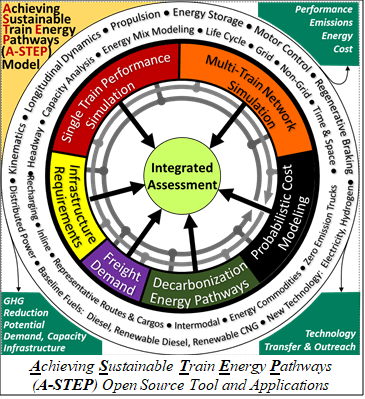
In 2018, over 26,000 Class I freight locomotives emitted 37 million metric tons of CO2 and 3.7 billion gallons of diesel fuel in the United States. Since the truck freight sector is considering utilizing electrification as a method to decrease its own carbon emissions, freight rail faces pressure as a competitor to also make emission cuts.
There is currently no state-of-the-art tool widely available to lead this effort so this ongoing project is developing open-source software — the Achieving Sustainable Train Energy Pathways (A-STEP) tool — to assess important variables in freight rail carbonization. Key components of this software include a train performance simulator, multi-train network simulation, infrastructure tools, energy mix and life cycle modeling, a probability cost model, and economic metric modeling for freight demand.
The main goals for this project are as follows: determine decarbonization options for U.S. Class 1 freight rail systems through spatial and decadal scales; outline the infrastructure requirements and decarbonization pathways that are necessary for massive decarbonization; evaluate variables and uncertainty in decarbonization methods and their subsequent effects on energy supply, cost, and infrastructure; and assess the economic feasibility of these proposed methods.
Tasks for this project include:
- Creating a single train performance model
- Developing a multi-train network model
- Determining the economic feasibility for infrastructure requirements
- Determining the economic feasibility of energy decarbonization methods
- Proposing a likely cost estimation
- Determining scenarios for freight demand
- Technology transfer & outreach (TTO)
- Integrated Assessment
North Carolina State University, Virginia Tech, Oregon State University, and DB Engineering and Consulting USA, Inc. are all collaborating on this project. VTTI's Dr. Hesham Rakha is tasked with leading the multi-train network simulation effort.